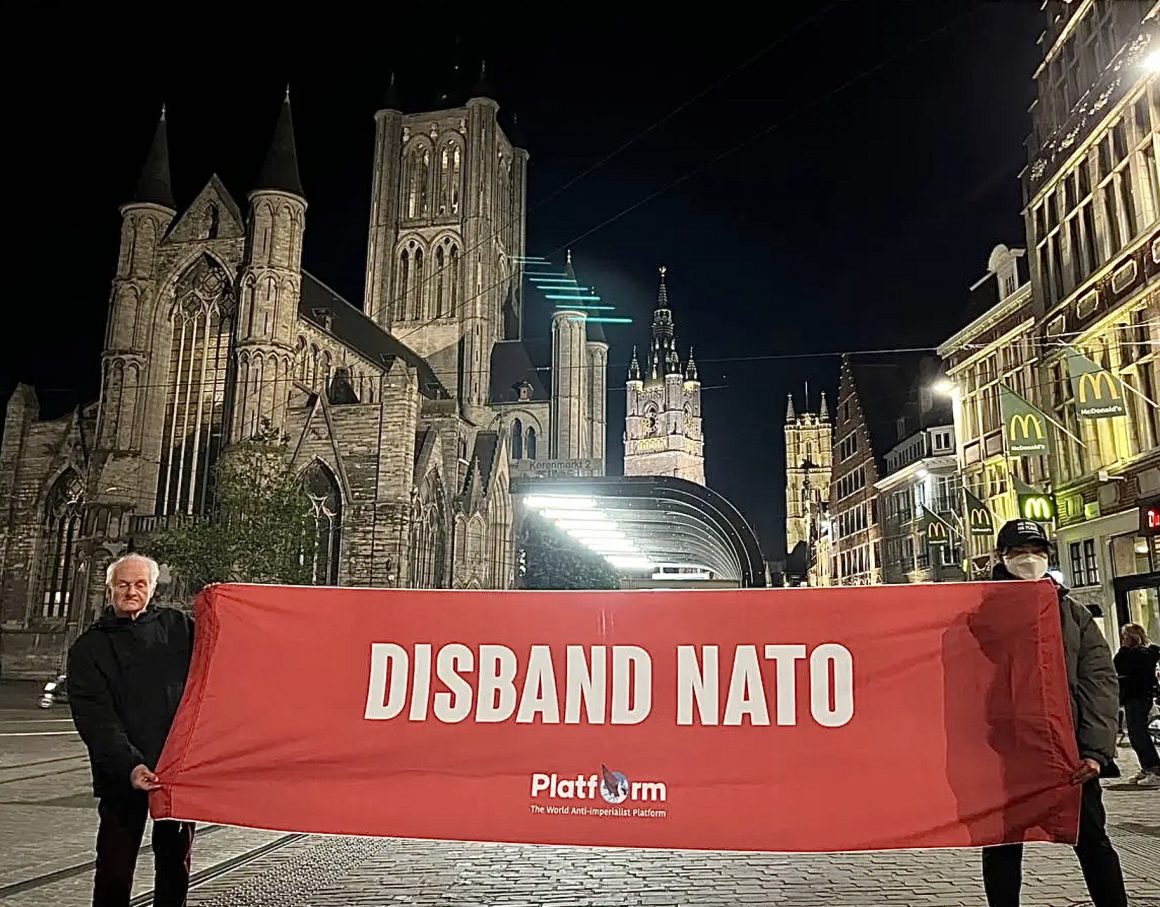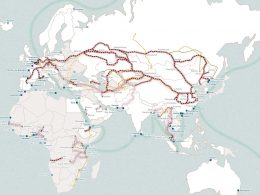Above: a recent anti-NATO display in Ghent, Belgium
Biden’s lost Ukraine gamble has forced the hegemon into a state of perpetual bargaining. As a consequence of Washington’s failing to show that it can either economically or militarily crush Russia, it can’t proceed with its original plan of shifting the proxy warfare location from Ukraine to Taiwan, and must now instead make Taiwan into a mere reserve. A hybrid war against BRICS now has to be the foremost priority, and the recent events in the Sehal have now made Africa into the likeliest place where the next imperialist psyops are carried out. This doesn’t mean, though, that the hegemon can afford to leave China be; it means the opposite, as this weakening of U.S. power makes defeating China more important than ever. Which makes the substantial opposition towards hybrid war on China throughout Europe even more of a hindrance towards imperialist interests.
It’s not just the particular neo-colonial interests of Washington which are being put at risk by the widespread awareness that the PRC isn’t worth challenging; it’s also, ultimately, the interests of the other imperial powers, namely France. Even though France is a major source of European hesitancy towards war on China, France is intensifying its warfare against Africa so it can regain the neo-colonial extraction sources it’s recently lost. China is providing Africa with the economic developmental means to be able to become independent from the imperialists; therefore, letting it continue to rise will in the long term make neo-colonialism’s extinction complete. Yet the costs of antagonizing China are so great that even France is refusing to do so.
The trend towards a post-American world order is so powerful that it’s getting certain colonial powers to compromise on their imperialist wars, simply due to how great the benefits are of a good relationship with the PRC. This spring, CGTN reported following Macron’s statements rejecting uncritical support for U.S. foreign policy:
France is China’s third largest trading partner and third largest source of actual investment in the European Union (EU) while China is the largest trading partner of France in Asia and the seventh largest in the world. Significant achievements have been made in cooperation between the two countries in the fields of economy and trade, science and technology, aviation and infrastructure…Both as firm advocates for a multi-polar world and for greater democracy in international relations, China and France have the ability and responsibility to rise above differences and obstacles, keep to the overall direction of a comprehensive strategic partnership that is stable, mutually beneficial, enterprising and dynamic, and practice true multilateralism for global peace, stability and prosperity, Xi said in his conversation with Macron…”France will not pick sides. Instead, France calls for unity and cooperation to keep relations stable between major countries,” said Macron, voicing France’s willingness to contribute to the growth of EU-China relations.
This week, the future of these relations got decided, and the option the EU picked was the most pro-China policy model we could have realistically expected it to adopt. Xinhua reports:
BEIJING, Aug. 6 (Xinhua) — China and the European Union (EU) should conduct more institutional dialogues to inject new and strong impetus into the China-EU comprehensive strategic partnership, Chinese Foreign Minister Wang Yi said here on Sunday. Wang, also a member of the Political Bureau of the Communist Party of China (CPC) Central Committee, made the remarks during a phone conversation with High Representative of the EU for Foreign Affairs and Security Policy Josep Borrell. For his part, Borrell expressed his deep condolences for the recent torrential rains and floods in China, and emphasized that the EU is firmly committed to developing good relations with China. The EU’s Global Gateway strategy and the Belt and Road Initiative are no rivalries but complementary to each other, as both are aimed at promoting global development, he added. Borrell stressed that he looks forward to visiting China as soon as possible and launching a strategic dialogue with the Chinese side to jointly prepare for this year’s EU-China leaders’ meeting and to promote the further development of EU-China relations.
This isn’t what the other most significant European actors are doing. The UK, which got brought under greater U.S. control with Brexit, has been complying with the pressure to become hostile towards China; the same is the case for Germany’s government, even as many of the country’s own biggest capitalists are concerned about the consequences of decoupling from China; this week, Italy left the BRI, which is consistent with the tendency of its recently elected government to do all it can to please Washington. These events can be seen as defeats for the anti-imperialist cause, except when you consider the wider context: that every time a European leader decides to participate in the new cold war, that leader further guarantees their country undergoes accelerated capitalist collapse.
These leaders should enjoy the praise that Washington gives to them; it’s the only real reward that they’ll get for trying to fight against history’s progression towards multipolarity. By refusing the benefits that China and Russia can give their economies; by investing in arms while their people are increasingly in need; they’re cultivating the conditions for workers revolutions within their countries. The new cold war is costly for its participants in a way that wasn’t the case for the colonial wars which gave them their imperialist holdings; those wars were waged by rising world powers, whereas this war is being waged by powers that are reacting to their own decline. And starting on a great new military and economic warfare project while in decline is going to have a crippling effect.
To contribute to the new cold war is to provide a mandate for the movement towards ending imperialism and establishing proletarian democracy. It proves the point that the Baltic members of the World Anti-Imperialist Platform made this year in response to the damages which the proxy war has done towards the region’s workers: “While using military force against other countries, the US has repeatedly employed chemical and biological weapons, cluster bombs, fuel-air explosives, graphite bombs, and depleted uranium munitions, causing damage to cities, people, and the environment as a whole. Such a situation in the world undoubtedly has the heaviest impact on the working class. Liberation from the imperialist dictatorship of the West, led by the United States, is required. Without such liberation, there is no hope for the working class to succeed in their political struggle in their respective countries. However, the common adversary is very powerful, and it is necessary to unite the efforts of those willing to fight against it.”
European communists—and U.S. communists by extension—can argue against wars for maintaining imperial extraction by saying to proletarians of their countries: these wars are materially hurting you vastly more than they’re “helping” you. Neo-colonialism overwhelmingly enriches the capitalists, and the minority of workers within the imperialist countries who belong to a labor aristocracy; the interests of most of the workers are in ending imperialism, and in establishing socialism. This argument is strengthened by the inflation, price gouging of living essentials, supply chain breakdowns, and energy crises that this proxy war is bringing.
Like Stalin wrote in The Foundations of Leninism, imperialism’s wars lead to deteriorating working class conditions, which make proletarian revolution a practical necessity; and part of what produces these disruptive events is the inter-imperialist rivalries which such wars ultimately come to involve. A rivalry like this could appear as the different imperialist players continue on the diverging paths they’ve chosen in regards to China.
France and the EU could come into dispute with the USA, and with the USA’s uncritical sycophants. They could increasingly need to resist the pressures Washington puts upon them to break from China, and this tension could escalate to the point where Washington starts waging hybrid warfare against them. That outcome isn’t guaranteed, since as I said the hegemon is now pivoting towards intensified war against Africa, and that could be something it unites with France on. How much the imperialists mutually undermine their own interests depends on how important Washington judges the war against China to be.
At present, the empire is able to refrain from acting too rashly when it comes to China; it’s responded to its Ukraine defeat both by seemingly giving up on the idea of a Taiwan proxy war, and by letting the PRC have a role in facilitating the process of bringing the Ukraine conflict to an end. It’s done the latter because it expects Russia to betray China, but this comes from liberal hubris; and this was argued by the furthest-right imperialists within the U.S. Senate, who sent a letter this last month saying that Washington should prioritize harming China even more:
We are concerned that the administration – by supporting a role for China in diplomacy over Ukraine – believes it can exploit what it has mistakenly perceived to be daylight between Russia and China…The erroneous assumption that a division is growing between China and Russia simply lays the groundwork for a policy that badly misunderstands PRC interests, and how it views its relationship with the Putin regime. First, openness to PRC diplomatic involvement in Ukraine will set a precedent for allowing PRC involvement in European security issues, the consequences of which would undermine U.S. and allied security interests for decades. It also allows Xi Jinping to present himself as a responsible party not only to European countries, but also to nations that have remained neutral on Russia’s invasion. Second, China’s role in a diplomatic peace settlement in Ukraine will clear the way for its substantial involvement in Ukraine’s reconstruction.
These are costs the hegemon is willing to accept; at least for as long as the far right, with its single-minded desire to destroy China, doesn’t come to power. By the calculations of the liberal technocrats, the biggest kinds of provocations the empire needs to carry out against the PRC at this stage are further efforts to militarize Taiwan; efforts made with the assumption that China or Russia will simply destroy Eurasia’s multipolar progression on their own. Washington can no longer determine the affairs of the globe as much as it used to, so it’s being forced to retreat and make ever-growing compromises. As these compromises allow for China’s influence across Europe to grow, the imperial powers are to come into a greater attitude of unease towards each other. All while the capitalists within these countries come into disputes, either with each other or with their governments, over whether they should accommodate the emerging multipolar world. Our class enemies fighting makes our victory all the more possible.
————————————————————————
If you appreciate my work, I hope you become a one-time or regular donor to my Patreon account. Like most of us, I’m feeling the economic pressures amid late-stage capitalism, and I need money to keep fighting for a new system that works for all of us. Go to my Patreon here.
To keep this platform effective amid the censorship against dissenting voices, join my Telegram channel.








